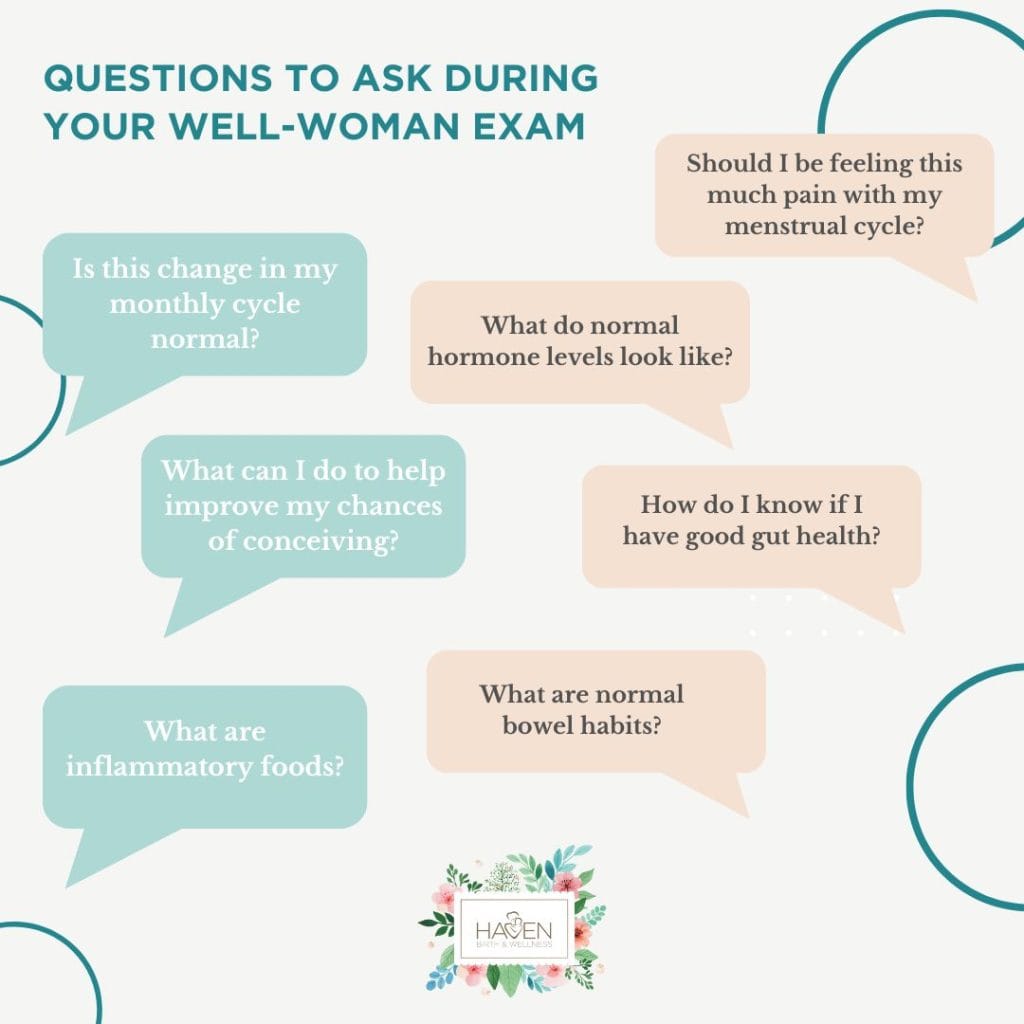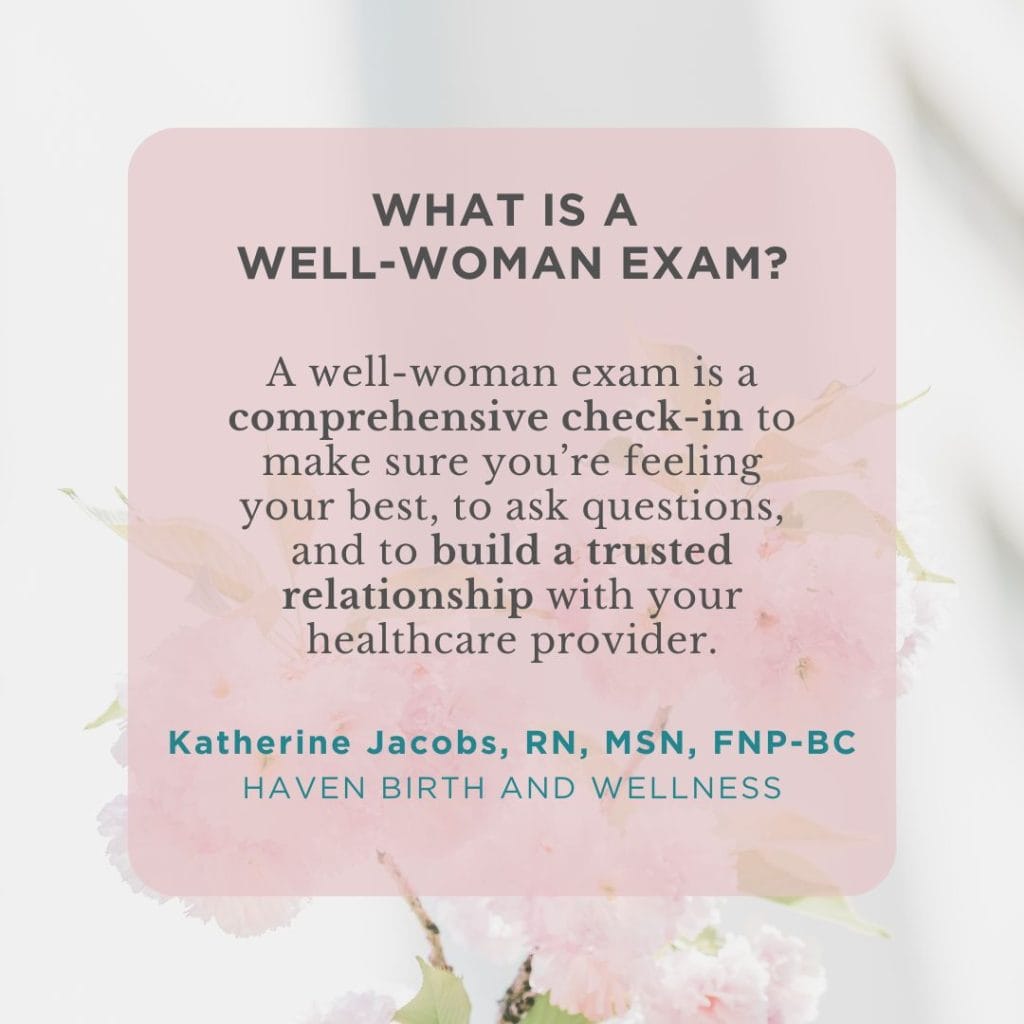

Taking care of your health is one of the best gifts you can give yourself, and a well-woman exam is a key part of that care. But what is a well-woman exam, exactly? What’s involved, who needs one, and when?
As a family nurse practitioner, I’m passionate about helping women understand their health and feel empowered in their choices. To that end, let’s dive into the details of well-woman exams, what they entail, and some relatively recent changes in guidelines.
What Is a Well-Woman Exam?
A well-woman exam is an annual visit that includes a basic physical with special attention paid to the female reproductive organs. In it, we address concerns related to menstrual health, reproductive health, and perimenopausal and menopausal health, depending on your needs and stage of life.
What Does a Well-Woman Exam Include?
Every well-woman visit includes a basic physical exam, medical history, and discussion. Your provider may also recommend annual blood work. Depending on your age and risk factors, you may discuss breast health screenings like mammography or thermography, as well as colonoscopies when appropriate.
In my appointments, I particularly focus on education, showing women a chart of the normal hormone cycle to improve their understanding of how their menstrual cycle works and its impact on how they feel throughout the month. We also discuss ovulation, what’s normal versus abnormal in their cycle, and any reproductive health concerns they have.
Other topics I reserve time for include nutrition, exercise, sleep, stress management, and questions about fertility or preparation for pregnancy.
What About a Pap Smear?
You might be wondering, what is a well-woman exam without a Pap smear? It’s a reasonable question, especially since not everyone is aware of recent changes in Pap smear guidelines.
Pap smears test for abnormal cervical cells and are an important part of screening for cervical cancer. But in 2012, research led the American Academy of Obstetricians and Gynecologists and other organizations to update the recommended frequency for screening measures like Pap smears and pelvic exams.
While they endorsed yearly screenings in the past, they now recommend pelvic exams only when indicated by symptoms or medical history and Pap smears once every three years until age 65. Women over 30 can even move to once every five years if they get co-testing for HPV alongside their Pap test.
More frequent screening only becomes necessary for women who change sexual partners or who receive abnormal test results that require monitoring or follow-up.
What Age Should You Get a Well-Woman Exam?
Before age 18, girls should be having discussions with their pediatrician about their menstrual cycles. If concerns develop, they may need to start visiting a gynecologist during adolescence.
In general, however, you’ll begin yearly well-woman exams at age 18. If you move on to a general practitioner after leaving your pediatrician, you may have the option of well-woman visits at their office. Or, you may choose to establish care with a gynecologist and get your well-woman exams there.
If you prefer a more integrative health approach and don’t have issues like a chronic illness or a need for medication management, you might decide to visit someone like me — a family nurse practitioner — at a midwife practice.
Questions to Expect During Your Well-Woman Exam
It can be helpful to know what kinds of questions to expect from your provider during your well-woman exam. A comprehensive visit usually includes questions about your:
- Menstrual cycle, including regularity, duration, flow, and pain level.
- Nutrition, such as what you eat on a day-to-day basis.
- Exercise and how you move your body weekly.
- Sleep habits, including your bedtime routine and how many hours you typically sleep.
- Stress management and any support that might be helpful.
- Medications and supplements and what you’re taking them for.

Questions to Ask During Your Well-Woman Exam
Many women suffer unnecessarily because they mistake “common” symptoms for “normal.” It’s important to ask questions about your symptoms — and to find a provider who listens to your concerns. For example, don’t hesitate to ask:
- Should I be feeling this much pain with my menstrual cycle?
- Is this change in my monthly cycle normal?
- What do normal hormone levels look like?
- What can I do to help improve my chances of conceiving?
Other questions I find valuable for discussion include:
- How do I know if I have good gut health?
- What are inflammatory foods?
- What are normal bowel habits?
What Is a Well-Woman Exam? Final Thoughts

So, what is a well-woman exam?
It’s so much more than just a Pap smear. A well-woman exam is a comprehensive check-in to make sure you’re feeling your best, to ask questions, and to build a trusted relationship with your healthcare provider.
Here at Haven Birth and Wellness, we believe in compassionate, personalized care. If it’s been a while since your last exam, or if you’re looking for a new provider, we’re here to support you.

Katherine Jacobs is a board-certified Family Nurse Practitioner with nearly two decades (17 years) of experience in pediatrics and women's health, along with specialized training from The Institute of Functional Medicine. She focuses on identifying the root causes of illness and guiding patients toward optimal health through personalized, holistic care. With a commitment to integrating lifestyle choices and environmental factors into her treatment plans, Katherine is dedicated to empowering her patients on their wellness journeys. Outside of work, she enjoys outdoor adventures, baking, and spending time with her family.
